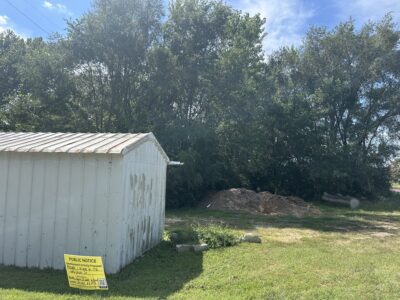Lawrence city commissioners to provide feedback on five-year Capital Improvement Plan

photo by: Bremen Keasey
Lawrence's City Hall, located at 6 E. Sixth St., shown during June 2025.
Lawrence city commissioners will get a first glance Tuesday night at the city’s proposed five-year Capital Improvement Plan, a key first step in developing the city’s budget for next year.
Commissioners will be asked to provide feedback about the CIP, which acts as a blueprint for sustaining and improving community infrastructure. It includes specific projects that exceed $100,000 and either create a new asset or enhance an existing asset beyond its useful life. The five-year projected cost for the CIP as proposed is $386 million, with roughly $157 million of projects anticipated to occur in 2026.
According to a city presentation, the projected costs for 2026 are lower than what was allocated for that year in last year’s CIP. That CIP called for $172 million in projects in 2026, as the Journal-World reported. Part of the decrease is because a few items that were in last year’s CIP are now marked as “unfunded,” meaning no money is currently set to be spent on them in the five-year plan. Those projects include a west Lawrence spray park, adding a new fire station for Lawrence-Douglas County Fire Medical and purchasing a new truck for an existing station.
The topic of the potential addition of a new LDCFM station, Station 6, will be one of the things the city staff will be asking for guidance from the commission on. The proposed CIP would include around $1.5 million for the project for 2026, then about $5.4 million and $5.7 million in 2027 and 2028, respectively. Last year’s initial budget proposal from City Manager Craig Owens would have increased property taxes to help add two additional stations for LDCFM. After pushback from members of the public, the commission approved a budget without the tax increase and pushed out the timeline for adding two new fire stations.
Another area where the city is seeking feedback is whether the CIP should focus more on street maintenance projects or completing the Lawrence Loop trail system. The presentation has two options about how to use the Capital Sales Tax fund — one that would prioritize street maintenance funding and one that funds some costs for three projects that would help complete the 22-mile Loop.
Based on this proposed CIP, projects funded by general obligation bonds will drop off significantly after 2026. That’s partly due to the expected completion of the $130 million public works campus, with the first phase expected to be completed in 2026 and the final phase finished in 2027, as the Journal-World reported. That project has the largest funding allocation of any individual project in the CIP, with $40.2 million allocated for it.

photo by: Screenshot of City of Lawrence
A photo from May 1 of the Municipal Services and Operations campus in eastern Lawrence. Work on the project began in December 2024.
Commissioners will not vote on the proposed CIP on Tuesday, but will provide feedback to city staff on any changes to be made, including potentially swapping some unfunded projects with funded ones or suggesting whether other projects should be delayed or prioritized.
The final CIP would be adopted alongside the 2026 budget, which the commission is scheduled to vote on on Sept. 16. The first budget proposal is scheduled to be presented to the commission on July 8.
• • •
In other business, commissioners will hold a public hearing to consider providing tax incentives for a proposed apartment development.
Flint Hills Holdings applied for development assistance on the upcoming 9 Del Lofts II project at 716 E. Ninth St, which plans for live-work units and affordable housing apartments. According to a city memo, the project would include six live-work units and 39 one-bedroom units.
The public hearing for this item was initially set for June 3, as the Journal-World reported, but it was eventually delayed.
The developer applied for financial incentives from the city, including the issuance of industrial revenue bonds for a sales tax exemption on construction cost and and a 95% Neighborhood Revitalization Act property tax abatement over 15 years on the valuation increase resulting from the development.
City staff said any tax incentives could enhance the competitiveness of its applications for federal tax credits for low-income housing. The project has received other financial support previously, including $450,000 from the City’s Affordable Housing Trust Fund, as the Journal-World reported. The project is also in a final funding round for the state’s 9% affordable housing tax credits. City staff notes in a memo that it may be one of the last developments to receive those credits from the state after the recent adoption of a bill that would end the program.
After the public hearing, the Neighborhood Revitalization Act plan will be presented to the Douglas County Commission and the Lawrence school board, where each body will make independent decisions on whether they want to participate in the plan.




